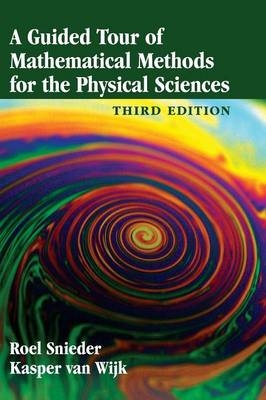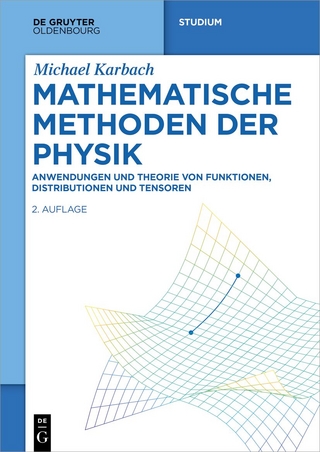
A Guided Tour of Mathematical Methods for the Physical Sciences
Cambridge University Press (Verlag)
978-1-107-08496-4 (ISBN)
Mathematical methods are essential tools for all physical scientists. This book provides a comprehensive tour of the mathematical knowledge and techniques that are needed by students across the physical sciences. In contrast to more traditional textbooks, all the material is presented in the form of exercises. Within these exercises, basic mathematical theory and its applications in the physical sciences are well integrated. In this way, the mathematical insights that readers acquire are driven by their physical-science insight. This third edition has been completely revised: new material has been added to most chapters, and two completely new chapters on probability and statistics and on inverse problems have been added. This guided tour of mathematical techniques is instructive, applied, and fun. This book is targeted for all students of the physical sciences. It can serve as a stand-alone text, or as a source of exercises and examples to complement other textbooks.
Roel Snieder holds the Keck Foundation Endowed Chair of Basic Exploration Science at the Colorado School of Mines. From 1997 to 2000, he served as Dean of the Faculty of Earth Sciences at the University of Utrecht. Snieder has served on the editorial boards of Geophysical Journal International, Inverse Problems, Reviews of Geophysics, and the European Journal of Physics. In 2000, he was elected Fellow of the American Geophysical Union. He is co-author of the textbook The Art of Being a Scientist: A Guide for Graduate Students and their Mentors (Cambridge University Press, 2009). From 2003 to 2011, he was a member of the Earth Science Council of the US Department of Energy. In 2008, Snieder worked for the Global Climate and Energy Project at Stanford University on outreach and education on global energy. That same year, he was a founding member of the humanitarian organization Geoscientists Without Borders, where he served as chair until 2013. In 2011, he was elected Honorary Member of the Society of Exploration Geophysicists. Kasper van Wijk is an Associate Professor in the Physics Department and Director of the Physical Acoustics Laboratory at the University of Auckland. He studied geophysics at the University of Utrecht from 1991 to 1996, where he specialized in inverse theory. After teaching outdoor education in the mountains of Colorado, Van Wijk obtained his PhD in geophysics from the Colorado School of Mines and taught at Boise State University. His research interests center around elastic-wave propagation in disordered media, with applications ranging from medical imaging to global seismology. Van Wijk has (co-)organized and taught geophysical field camps in Colorado, Oregon, and Thailand. His worldwide outreach efforts, as part of Seismometers in Schools, have exposed diverse audiences to the dynamic processes of our Earth.
1. Introduction; 2. Dimensional analysis; 3. Power series; 4. Spherical and cylindrical coordinates; 5. Gradient; 6. Divergence of a vector field; 7. Curl of a vector field; 8. Theorem of Gauss; 9. Theorem of Stokes; 10. The Laplacian; 11. Scale analysis; 12. Linear algebra; 13. Dirac delta function; 14. Fourier analysis; 15. Analytic functions; 16. Complex integration; 17. Green's functions: principles; 18. Green's functions: examples; 19. Normal modes; 20. Potential-field theory; 21. Probability and statistics; 22. Inverse problems; 23. Perturbation theory; 24. Asymptotic evaluation of integrals; 25. Conservation laws; 26. Cartesian tensors; 27. Variational calculus; 28. Epilogue on power and knowledge.
| Erscheint lt. Verlag | 16.3.2015 |
|---|---|
| Zusatzinfo | 10 Tables, unspecified; 17 Halftones, unspecified; 136 Line drawings, unspecified |
| Verlagsort | Cambridge |
| Sprache | englisch |
| Maße | 180 x 254 mm |
| Gewicht | 1360 g |
| Themenwelt | Mathematik / Informatik ► Mathematik ► Angewandte Mathematik |
| Naturwissenschaften ► Physik / Astronomie ► Angewandte Physik | |
| ISBN-10 | 1-107-08496-2 / 1107084962 |
| ISBN-13 | 978-1-107-08496-4 / 9781107084964 |
| Zustand | Neuware |
| Haben Sie eine Frage zum Produkt? |
aus dem Bereich


